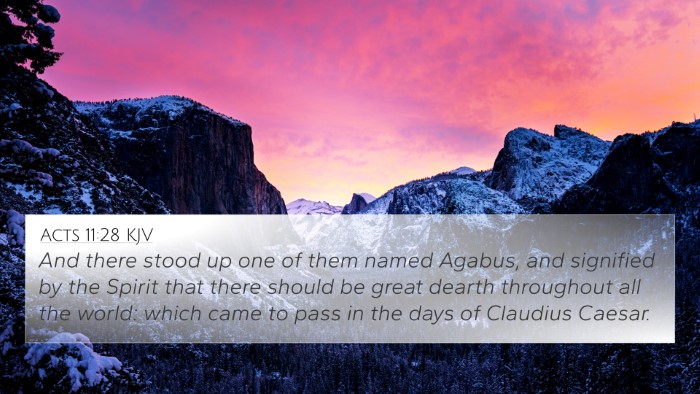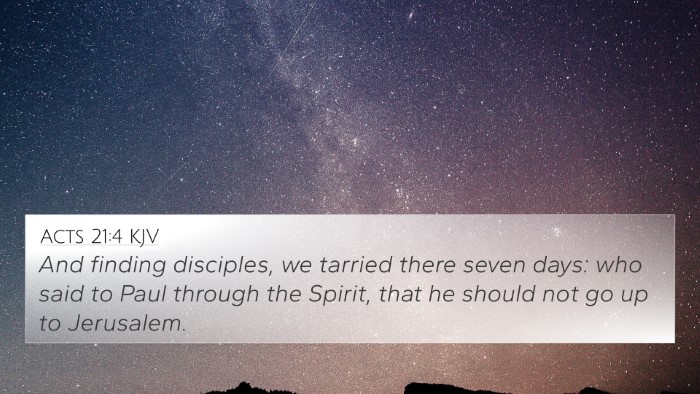Understanding Acts 21:10
Verse: Acts 21:10 - "And as we tarried there many days, there came down from Judaea a certain prophet, named Agabus."
Summary of Meaning
In this pivotal moment of the Book of Acts, the introduction of Agabus, a prophet from Judea, signifies God's continued guidance through prophetic means within the early church. His arrival and the message he brings are critical in shaping the narrative and decisions concerning the Apostle Paul's impending journey to Jerusalem. This verse exemplifies the role of the prophets in the New Testament as intermediaries of divine revelation.
Commentary Insights
-
Matthew Henry's Commentary
Matthew Henry highlights the importance of prophecy in the early church. He notes that Agabus's coming is not merely coincidental but is part of God’s providential plan for Paul. The warning from Agabus about the coming dangers faced by Paul in Jerusalem emphasizes the serious nature of Paul's mission and the tension between obedience to God’s call and the peril associated with it.
-
Albert Barnes' Notes
Albert Barnes provides an interpretation that focuses on the character of Agabus. He points out that Agabus's previous prophecy regarding famine (Acts 11:28) establishes his credibility as a prophet. Barnes also elaborates on how prophetic warnings serve both as guidance for believers and as an acknowledgment of the dangers of God’s work, indicating that true faith often walks through trials.
-
Adam Clarke's Commentary
Adam Clarke delves into the historical background of Agabus as a notable prophet. He emphasizes that the warnings given should not instill fear but to prepare the apostles for what lies ahead. Clarke also connects this instance of prophecy with the broader theme of the Holy Spirit guiding the actions and decisions of believers, highlighting the need to remain steadfast even amid adversity.
Cross-References Related to Acts 21:10
- Acts 11:28: Agabus prophesies a famine, demonstrating his prophetic role.
- Acts 20:22-23: Paul’s anticipation of trials in Jerusalem coincides with the warning from Agabus, showing a parallel prophetic message.
- Romans 8:28: Despite the dangers, there is assurance in God’s overarching plan for good, connecting with Paul's journey.
- 2 Timothy 3:12: Paul acknowledges that all who desire to live godly will suffer persecution, resonating with Agabus's warning.
- 1 Thessalonians 5:20-21: Paul encourages not to despise prophecies but to test everything—important in discerning the prophetic message of Agabus.
- Jeremiah 23:28: The role of true prophets in sharing God’s messages is affirmed, paralleling Agabus's function.
- Acts 4:23-31: The importance of community prayer in response to prophetic warning reflects the early church’s unity and resilience.
Connections with Other Bible Verses
The narrative of Acts 21:10 is deeply interconnected with various themes and verses throughout Scripture. It invites readers to explore:
- The resilience of faith amidst trials, as illustrated in Philippians 1:29, where suffering for Christ is seen as a privilege.
- The role of the Holy Spirit in guiding and preparing believers for what lies ahead, akin to John 16:13 where the Spirit leads into all truth.
- The function and credibility of the prophets, drawing upon Ephesians 2:20, which emphasizes the foundation of the church built upon prophets and apostles.
Exploring Themes and Cross-References
This verse exemplifies how God uses various means, including prophets, to communicate His plans. The following themes arise from the interactions surrounding Acts 21:10:
- God’s Providence: Prophetic messages as part of God’s controlling purpose.
- Courage in the Face of Danger: Paul’s determination despite the warnings speaks to the strength found in faith.
- Community and Accountability: The early church's response to prophetic words places emphasis on communal discernment and support.
Thematic Bible Verse Connections
Acts 21:10 aligns with a broader scriptural narrative that includes themes of prophecy, courage under persecution, and divine guidance. These connections not only enhance understanding but also serve as a foundation for further study:
- Isaiah 30:21: "And thine ears shall hear a word behind thee, saying, This is the way, walk ye in it," reflecting God’s continuous communication.
- Luke 21:12: "But before all these, they shall lay their hands on you, and persecute you," correlating with the message Agabus delivers.
- 1 Corinthians 12:28: Affirming the roles of prophets within the church, which is crucial for understanding Agabus's significance.
Conclusion
Acts 21:10 stands as a powerful reminder of how God communicates with His people, employing prophets to forewarn and guide. The interplay of prophetic declarations and the response of believers enriches our understanding of faith in action. Through careful study and cross-referencing other scriptures, one can uncover a deeper appreciation for the interconnectedness of the Bible, showcasing the thematic dialogues across the Testaments.






